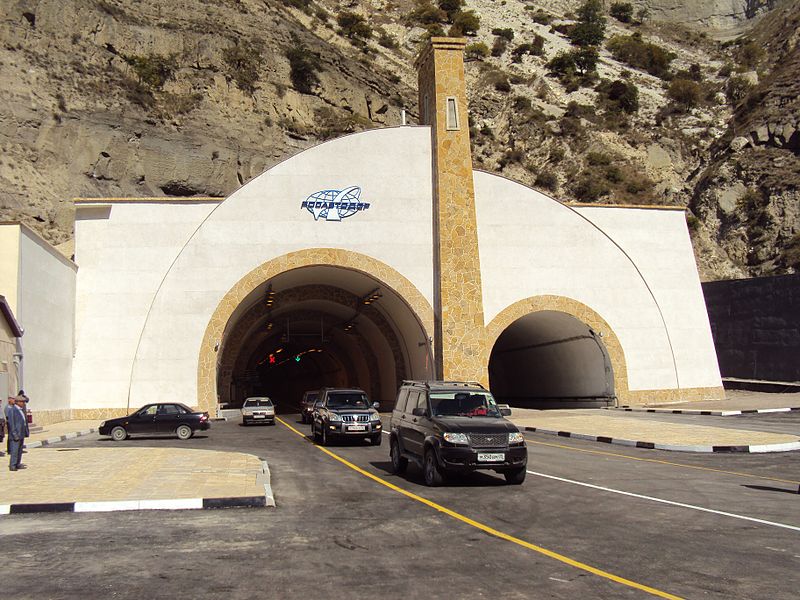
Dagestani Authorities Struggle to Install Social Order in Republic
Publication: Eurasia Daily Monitor Volume: 11 Issue: 166
By:

On September 18, the authorities in Dagestan closed down the Gimry tunnel, citing the ongoing counter-terrorist operation in Untsukul district. A counter-terrorist operation was also introduced in the adjacent Buinaksk district on September 17. Locals estimated that over 1,000 military personnel blocked the areas around the notorious Untsukul district village of Gimry, reportedly searching for members of the “Gimry bandit group.” One local resident told the Kavkazsky Uzel website: “I do not know who remained there, but the police say they detected movements in the forest. We do not mind—let them catch the rebels. We are only hoping that the authorities will not start burning the forests again.” The authorities promised to reopen the tunnel in five days, but it is unclear whether they will. The government introduced the counter-terrorist regime in Untsukul district back in March, and while it was never formally lifted, the government announced another counter-terrorist regime there in July. Locals say that a curfew and constant ID checks have been in place in the district for months (Kavkazsky Uzel, September 19).
The Gimry tunnel, which is more than 4 kilometers long, is the longest road tunnel in the Russian Federation and has a capacity of 4,000 cars per hour. While construction of the tunnel started back in 1979, it was only finally completed and opened in 2012. The building of the tunnel was related to the construction of the Irganai hydroelectric plant in Dagestan’s mountains. The tunnel connects a large part of mountainous Dagestan to the lowlands of the republic, the capital Makhachkala and the regional city of Buinaksk. However, the tunnel has been blocked multiple times due to the ongoing government campaign against insurgent strongholds in the area, in particular the so-called Gimry jamaat.
In January, Dagestan’s Governor Ramazan Abdulatipov visited Untsukul district and offered the residents of Gimry a deal: the government would provide them salaries and attend other needs they have if they started fighting the insurgents. The deal was hailed as a solution to the long-standing problem this restive area posed. However, the agreement evidently did not receive much support from the locals, probably because there was no real dialogue between the two sides and it was signed under heavy government pressure. An estimated 100 villagers are studying abroad at various Islamic institutions. Abdulatipov warned village residents that these individuals either have to return home at once or face being listed automatically as extremists. Explaining his opposition to the study of Islam in foreign countries, Abdulatipov said: “We received Islam from the Arab countries, but today the Islamic world, especially, the Arab one, is under the influence of extremist forces, so we should be very cautious about our contacts” (kavpolit.com, January 27).
Dagestan’s law enforcement agencies have themselves come under increasing criticism. In August, a police officer from the Center for Combatting Extremism arrested a 24-year-old female in Makhachkala. The woman claimed that a police officer raped her while she was in detention. After rights activists lodged an official appeal to investigate the alleged crime, the police threatened the victim again (Kavkazsky Uzel, September 18). Even some Dagestani officials criticized the police for failing to do something about the alleged crime. However, the republican police are accustomed to a climate of impunity and have done little after nearly a month of internal investigation.
On September 3, unidentified killers murdered five young men from town of Shamkhal, a suburb of Makhachkala. The young men were shot to death while they were hunting for rabbits in a nearby forest. The authorities announced that the insurgency was behind the crime, but the relatives of the slain men took to the streets to protest the official investigation. On September 8, an estimated 100 people staged a street protest demanding that the authorities investigate possible police involvement in the killings. Relatives of the victims fear that the police mistook the young men for rebels and killed them and are now trying to put the blame on anonymous militants. “On the very first day after the murder, without any investigation, the authorities stated that the militants killed our boys,” an uncle of one of the victims told the Dagestani weekly newspaper, Novoe Delo. “I am not a supporter of the militants—perhaps, even an opponent—but blaming the militants without any proof is not right. We do not want this case to be forgotten; we want a proper investigation” (Novoe Delo, September 15).
As the conflict in Dagestan grinds on, the government forces remain unaccountable for their errors and crimes. The impunity of government agencies and their lack of accountability are arguably shifting the allegiance of the republic’s residents away from the government.




